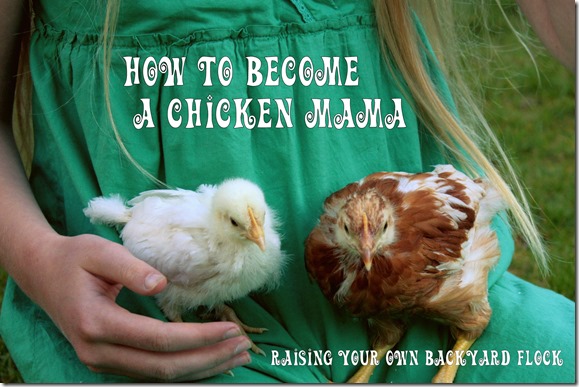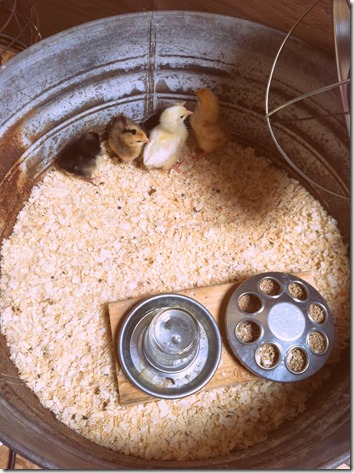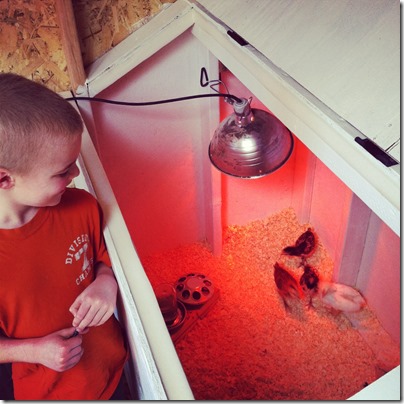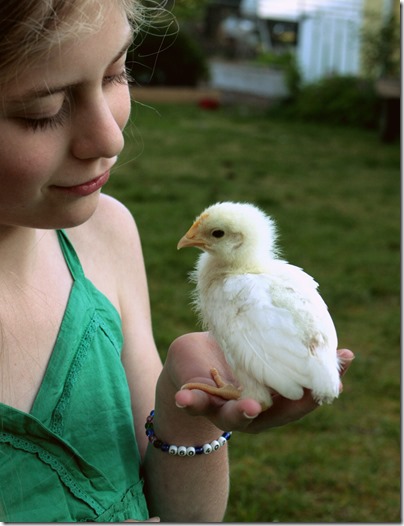Raising baby chickens is a rewarding task that leaves us with entertainment, wonderful learning opportunities, and of course, amazing eggs. If you have ever thought about raising your own chickens for eggs now is the time to consider giving your children the rare experience of having their very own backyard flock!
My daughter is a chicken mama. She spends her mornings outside with two different flocks of hens. Her brand new flock and my three year old hens. I watch her each day and my heart swells with pride. I can see her eyes light up when her baby chicks learn something new…. in those moments I can imagine her face in years to come with her own children’s first steps. I take joy in the times where get a window to the woman she will become and I love all the things she is learning through our little farmyard in the city!
Creating and tending your own little flock doesn’t have to be difficult or elaborate. But there are a few things you need to be sure to provide.
#1. Somewhere warm; A large rubber tote with a heat lamp works great. Baby chicks need to be kept about 90 – 95 degrees at all times for the first few weeks. They quickly learn to regulate their own temperature by moving closer or farther away from the heat lamp. After the first few weeks their heating requirements drop quickly until they no longer need the heat lamp at all. Even in the winter! These babies grow fast, so get the biggest tote you can.
#2. Somewhere safe; Make sure they have a predator proof area to put them in. A garage or shed that closes and locks works well.
#3. Bedding; It soaks up the poo. (And there is quite a bit of poo.) We get white pine chips as smell-busting cedar is said to cause chickens respiratory issues. Be sure to keep it as clean as possible. This prevents diseases that can be carried to scratching and foraging hens through the bedding. It is recommended that chick bedding is 1 – 2 inches deep and cleaned weekly. We toss the chips into our composter and it helps create amazing, nitrogen rich compost for our garden the next year.
One thing to look out for in your babies is a condition known as ‘pasting up’. This is when the vent of the chicken (the part where the poop comes from) gets pasted with poo and they can not get it off themselves. You can gently pull off the dried excrement with a damp paper towel until the vent is clean and then add your little one right back into the flock. It is easy to fix, but fatal if ignored, so make sure to keep your babies clean.
{My son Logan with our chicks in their new coop in our shed.}
#4. Food and water; Baby chicks have different nutritional requirements than laying hens. Luckily, you don’t have to figure any of that out! Each phase of life has a different ‘perfect’ food and your local supplier will have all the info you could need about what to use for whatever phase your chickens are in. (Notice the feeder and waterer in the picture above. These are available for a few dollars at the same supplier.)
#5. A coop and run; There are literally hundreds of designs for backyard chicken coops out there now, so I will let you search through them to find the perfect one for your flock, but by the time your babies have all their feathers, you will definitely want them out of your garage. ![]()
#6. Loving care; Handling your chickens each day creates a gentle and friendly flock that will be more likely to give you large amounts of entertainment and joy when they are full grown hens. Whistle or hum a tune as you go into their space so they know you are coming or bring them a treat when you come visiting and they will soon come to you. The more time you spend with them, the more gentle and trusting they become.
Chickens are the least likely of pets, but also some of the most rewarding!













We have 3 week old Buff Orpingtons. We love watching them as they learn to roost, scratch, roll in dust and fly! Great post!
@Melissa – We LOVE our Buff Orpington! Her name is Bessie and she is featured in this post here. 😉 http://goddesshobbies.blogspot.com/2013/04/guess-what.html She is the best layer we have by far. She has laid nearly every day for three years now. It’s quite impressive. I hope you enjoy your little flock!
Blessings,
Val
Hi,
I am preparing to enter into this adventure and wonder how long these fresh eggs keep in the refrigerator. My family goes through periods of eating a lot of eggs and then not so many.
Thanks,
Melissa
Hi Ann! We keep ours in the fridge for few weeks and haven’t gotten a bad one yet. When in doubt, drop your eggs into water and if it sinks , it’s fine. But if it floats, throw it away. Good luck w your flock!